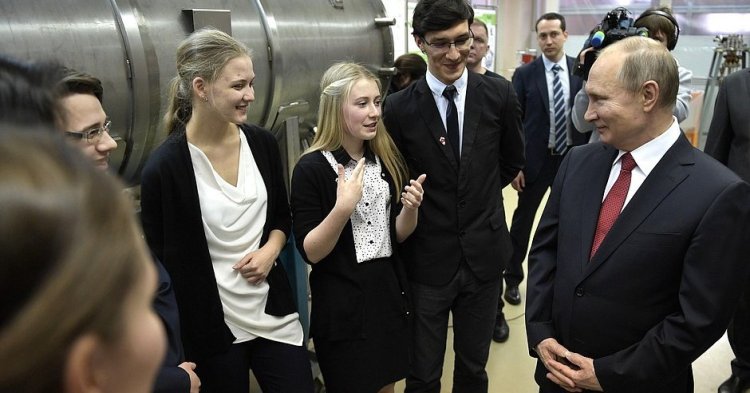According to the recently published Worldwide Educating For the Future Index (WEFFI), produced by the Economist Intelligence Unit and presented by the Yidan Prize Foundation, an entity created by Tencent co-founder Chen Yidan to promote international education, Russia is ranked 26th worldwide on ensuring its youth is future-ready. The result marks a one-position improvement compared to the Index produced in 2017.
The improvements are attributed to the recently introduced state education strategy that is modified with clear milestones, implementation metrics and action plan. Earlier, President Vladimir Putin also ordered to split Russia’s Education and Science Ministry into two federal departments: the Education Ministry and the Science and Higher Education Ministry. The move was deemed to be helpful in improving monitoring of the quality of secondary and higher education.
Earlier this year, Russia has likewise witnessed an improvement in Times Higher Education World University Rankings. The number of the country’s universities on the list rose from 27 to 35, making its schools the fourth-most represented in the list of other emerging economies. Russia’s top university, the Moscow State University (MSU), however, was only placed 199th in the magazine’s 2019 rankings.
Improvements come at times when the Kremlin is striving to boost the numbers of foreign students. Earlier, the amount of such students enrolled in Russian universities went up by 40% from 2013 to 2017. The country currently hosts more than 243,752 international students and aims to triple the amount to more than 700,000 by 2025.
Local officials still predominantly perceive education through the prism of old Soviet tenet of ‘soft power’. Therefore, education is seen as a tool to assist in nurturing friendly elites with preferable ideological persuasions, mainly throughout emerging markets, some former Soviet satellite states and specifically the Commonwealth of Independent States, hence cultivating close political and cultural long-term ties.
Although Russian education is clearly lagging behind in quality compared to Western analogues, it is much more affordable to those who struggle with getting any higher education whatsoever, especially those in developing or impoverished communities.
In addition to generous funding available to international students, Russia also offers rare degrees at such fields as medicine and engineering for reasonable fees, or for no price at all. Recently, Russian State Atomic Energy Corporation, Rosatom, announced scholarships in nuclear engineering for Indian students, which is just one of the many examples.
Improvements in rankings and quests to turn the country into an international educational hub that existed in the times of the Soviet Union further accentuate the increasing politicisation of higher education that is not going away any time soon.
Throughout the past years, Russia has been increasingly returning towards the once-forgotten Soviet education practices and witnessing greater pressure from revanchist-minded officials. Last year, President Vladimir Putin recreated a patriotic directorate inside the Russian army that echoed mandatory Marxist indoctrination in the days of the USSR.
The country has also launched an unprecedented crackdown on ideologically unreliable private education.
Last summer, Rosobrnadzor, Russia’s education watchdog revoked the accreditation of the Moscow School of Social and Economic Sciences that is considered one of the top and last remaining private universities. In 2016, another major private university, the European University in St. Petersburg - a private post-graduate school for social sciences and the humanities that was once named as the top research university of Russia - also lost its licence amidst unclear messages from the state regulator.
This crackdown, however, comes at a strange time, as Russia is actually experiencing a boom in investments in private schooling. With more wealthy Russians seeing the state’s efforts to impose a unified and inflexible curriculum as a dangerous path, those who can afford it prefer to send their children to private schools where they are exposed to Western-style curriculums with a heavy emphasis on mastering English.
Although improvements in ranking seem impressive, many remain sceptical about the long-term perspectives of Russian education. Last year, 22,000 mathematics teachers across the country participated in a voluntary anonymous exam to test their competence, and almost half the study participants failed.
According to Trisha Suresh, a senior analyst at The Economist Intelligence Unit, Russia still relies on science and traditional skills, while learning resources only partly cover skills needed to succeed in the future. The country also ranks low for teacher salary and in the socio-economic environment category, which likely precludes it from achieving further improvements in the unit’s ranking.
While witnessing unprecedented yet stable improvements since the decadent post-Soviet era, positive changes might not reflect Russia’s burdensome structural problems. The latter threaten to put an extra pressure on the troubled field of education in Russia, hence hindering further progress.


Follow the comments: |
|
